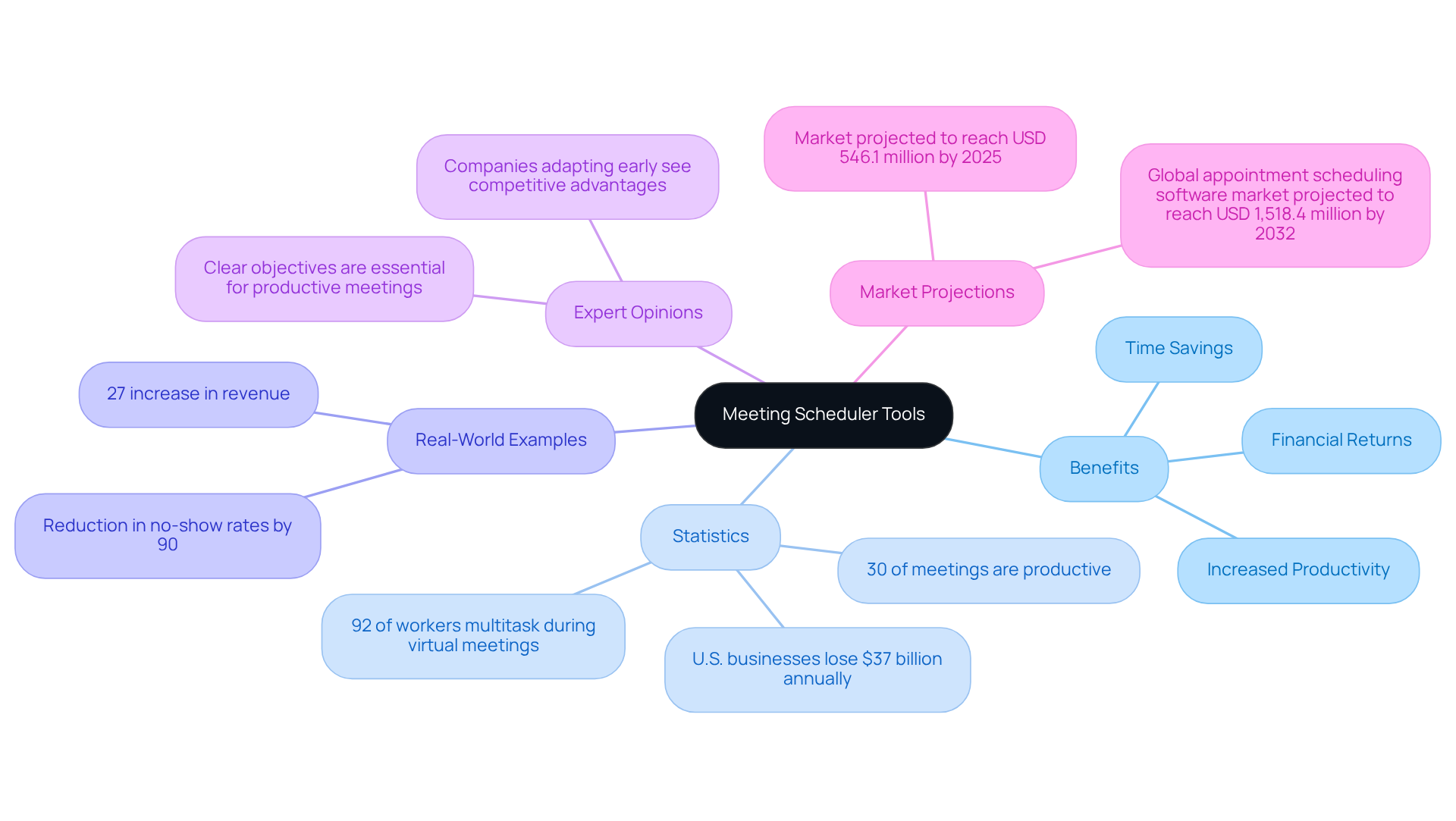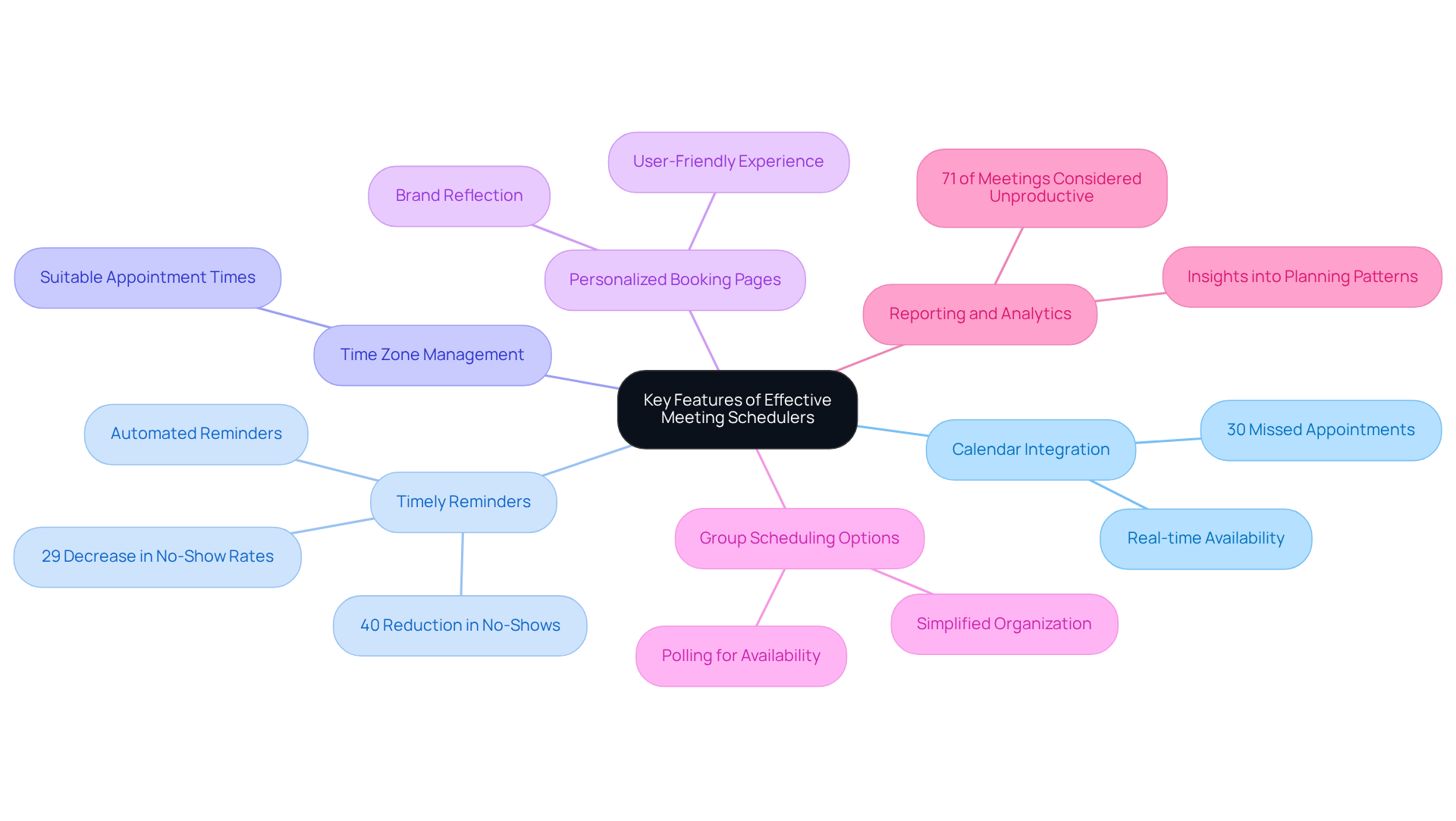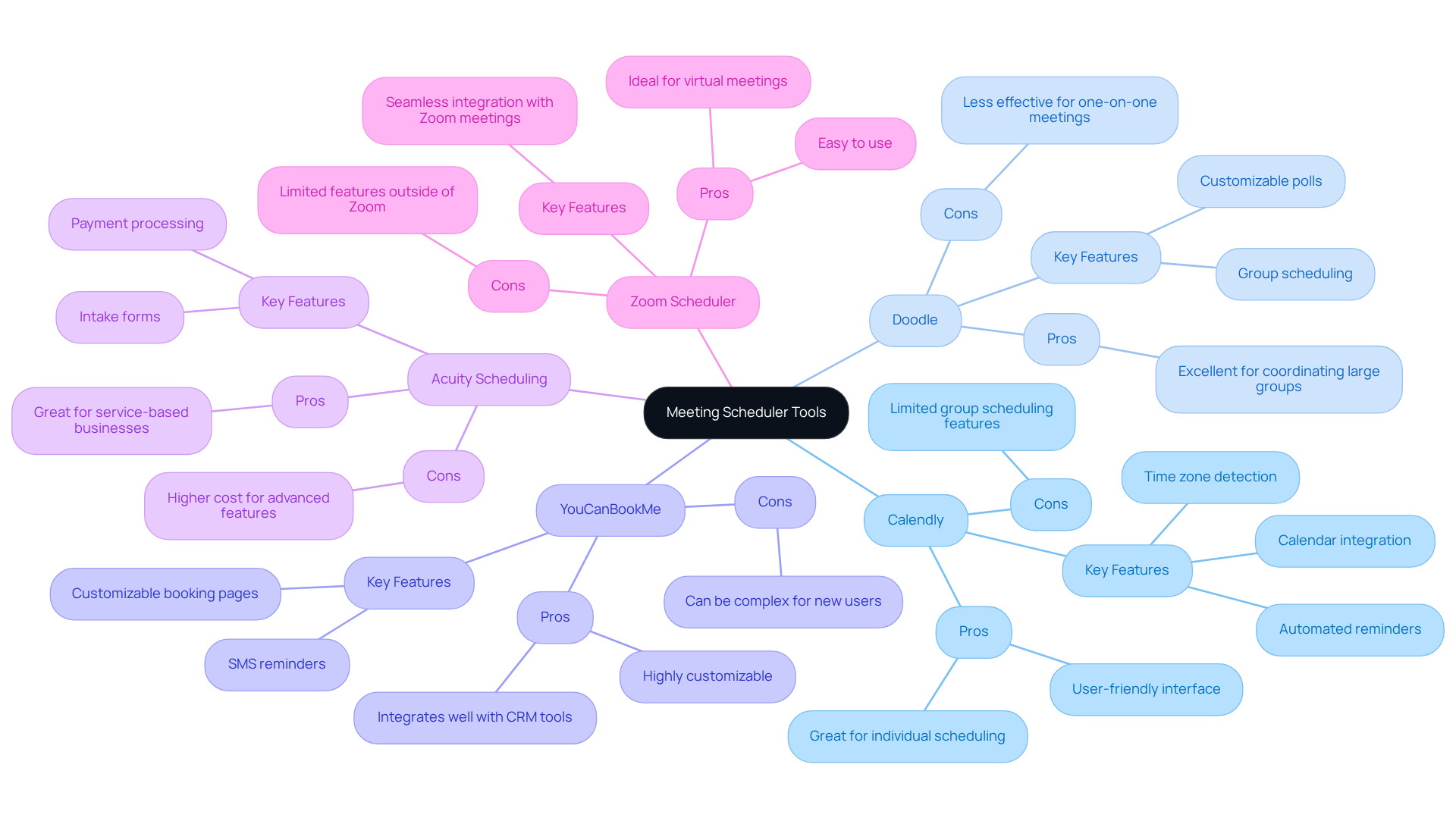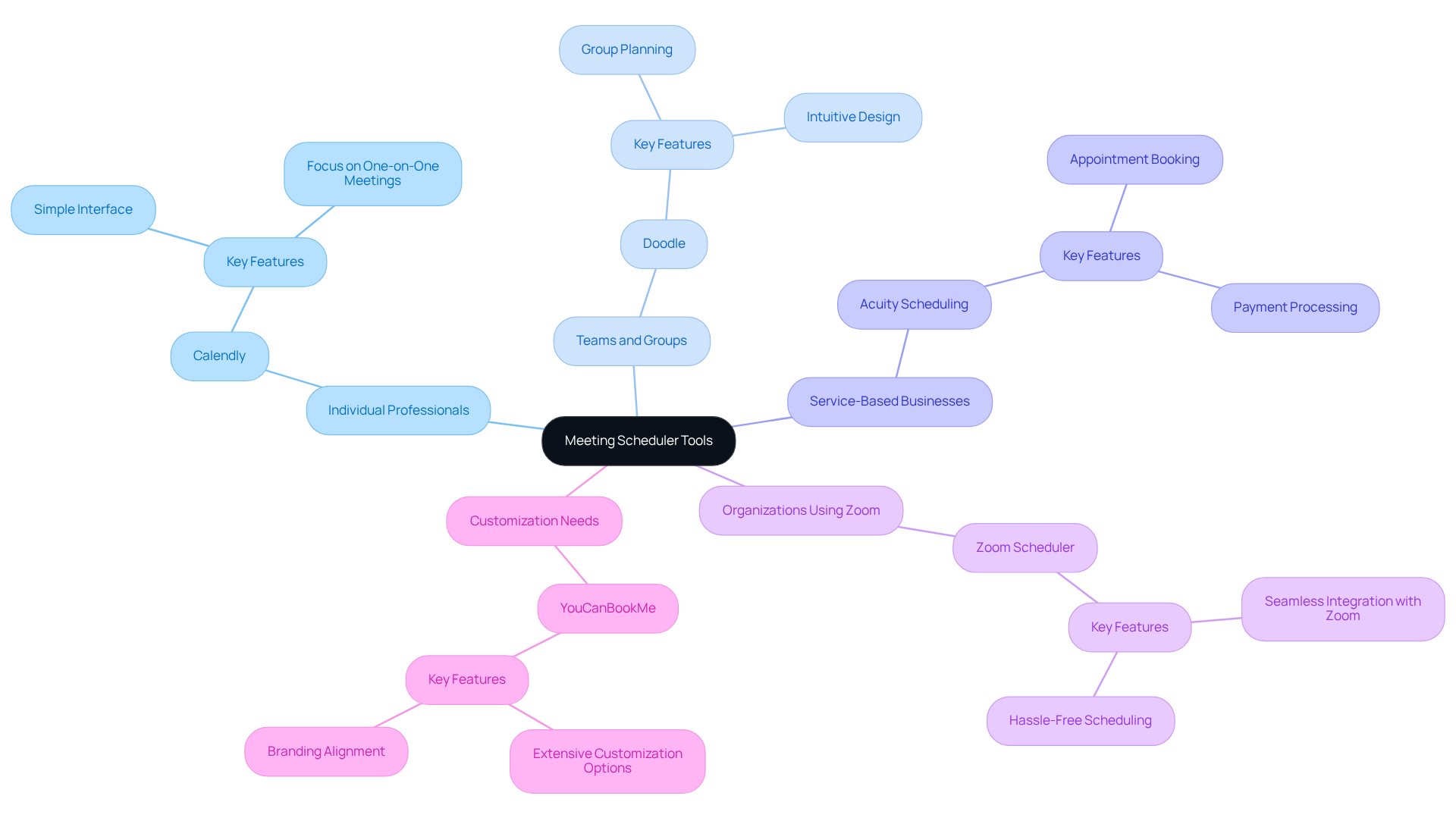Find the Best Meeting Scheduler Tool for Your Operations Needs

Introduction
The modern workplace frequently grapples with the inefficiencies of scheduling meetings, resulting in wasted time and unproductive discussions. This challenge not only hampers productivity but also affects overall organizational effectiveness. Enter meeting scheduler tools – an innovative solution designed to streamline this process and significantly enhance productivity. However, with a multitude of options available, how can one discern which tool aligns best with their unique operational needs?
To navigate this landscape, it’s essential to understand the specific benefits these tools offer. They can:
- Reduce the back-and-forth communication often associated with scheduling, allowing teams to focus on what truly matters – productive collaboration.
- Come equipped with features such as calendar integration, automated reminders, and analytics to track meeting effectiveness.
As organizations strive for greater efficiency, the right meeting scheduler can be a game-changer. By exploring the various options available, businesses can find a solution that not only meets their needs but also fosters a culture of effective communication and collaboration.
Understanding Meeting Scheduler Tools
Appointment organizer applications are essential software tools that function as the best meeting scheduler tool, streamlining the process of scheduling meetings and events by automating the search for suitable times for all participants. This automation drastically cuts down the back-and-forth communication typically involved in scheduling, enabling teams to concentrate on more pressing tasks. By seamlessly integrating with existing calendars, such as Google Calendar and Outlook, these applications provide real-time availability, allowing users to set appointments without conflicts.
The impact of the best meeting scheduler tool on productivity is significant. Organizations that leverage the best meeting scheduler tool can save substantial time, as studies indicate that unproductive meetings cost U.S. businesses approximately $37 billion annually. Furthermore, only 30% of meetings are deemed productive, and 61% of C-suite executives attribute unproductive meetings to vague objectives, underscoring the need for effective planning solutions.
Real-world examples further illustrate the advantages of these tools. Companies that implement automated scheduling solutions report a remarkable 27% increase in revenue and a reduction in no-show rates by as much as 90%. This demonstrates the tangible return on investment that can be achieved through efficient planning practices. Additionally, businesses utilizing online booking experience an average revenue increase of 27%, highlighting the financial benefits of adopting planning tools.
Industry leaders emphasize the importance of the best meeting scheduler tool for automating appointment scheduling. As one expert remarked, “Companies that adapt early to this trend are already seeing competitive advantages.” This sentiment is echoed by David Smith, who asserts, “By quantifying the financial impact of meetings and analyzing their outcomes, organizations can pinpoint areas for improvement.” The market for appointment scheduling software is projected to reach USD 546.1 million by 2025, driven by the rising demand for customer-centric services.
In conclusion, scheduling applications not only enhance operational efficiency but also play a crucial role in increasing overall productivity within organizations. By utilizing these tools, businesses can ensure that meetings are more focused, relevant, and ultimately more productive.

Key Features of Effective Meeting Schedulers
Effective meeting schedulers are the best meeting scheduler tool that tackle the pervasive issue of communication inefficiencies, significantly enhancing productivity.
-
Calendar Integration: The best meeting scheduler tool provides seamless integration with popular calendar applications, enabling users to view their availability in real-time and effectively reducing scheduling conflicts. This feature is crucial; studies indicate that up to 30% of appointments can be missed without proper reminders, often due to miscommunication about availability.
-
Sending timely reminders to participants is vital for minimizing no-shows and ensuring everyone is informed, and using the best meeting scheduler tool can help achieve this. Automated reminders can decrease no-show rates by up to 29%. A dental clinic case study demonstrated a remarkable 40% reduction in no-show rates after adopting such reminders, promoting improved attendance and participation during sessions.
-
Time Zone Management: For teams operating across various time zones, the best meeting scheduler tool ensures that appointments are arranged at suitable times for all participants, enhancing inclusivity and involvement.
-
The best meeting scheduler tool allows users to create personalized booking pages that reflect their branding and specific appointment needs, making the process more user-friendly and professional.
-
Group Scheduling Options: Tools like Doodle, recognized as the best meeting scheduler tool, enable polling among participants for their availability, simplifying the organization of group gatherings and ensuring that everyone can attend.
-
Reporting and Analytics: Some tools, including the best meeting scheduler tool, provide insights into planning patterns, enabling organizations to enhance their strategy for gatherings. With 71% of professionals indicating that meetings are frequently unproductive, utilizing analytics can assist in recognizing and eliminating inefficiencies in gathering practices.
Incorporating these elements not only streamlines the planning process but also enhances the effectiveness of the best meeting scheduler tool, fostering a more structured operational environment. Moreover, the cost-effectiveness of automated reminders, averaging €0.41 per reminder, significantly reduces the financial burden compared to traditional methods.

Comparative Analysis of Top Meeting Scheduler Tools
Tool Name | Key Features | Pros | Cons |
——————|————————————————–|——————————————-|——————————————-|
Calendly | Calendar integration, automated reminders, time zone detection | User-friendly interface, great for individual scheduling | Limited group scheduling features |
Doodle | Group scheduling, customizable polls | Excellent for coordinating large groups | Less effective for one-on-one meetings |
YouCanBookMe | Customizable booking pages, SMS reminders | Highly customizable, integrates well with CRM tools | Can be complex for new users |
Acuity Scheduling | Payment processing, intake forms | Great for service-based businesses | Higher cost for advanced features |
Zoom Scheduler | Seamless integration with Zoom meetings | Ideal for virtual meetings, easy to use | Limited features outside of Zoom |

Recommendations Based on User Needs
When it comes to selecting the best meeting scheduler tool, addressing communication inefficiencies is crucial. Many professionals struggle with the complexities of scheduling, which can lead to wasted time and missed opportunities. Fortunately, there are tailored solutions that can streamline this process.
- For Individual Professionals: Calendly stands out as the go-to option for those primarily scheduling one-on-one meetings. Its simple interface and essential features make it easy to use, allowing users to focus on what truly matters – connecting with clients.
- For Teams and Groups: Doodle excels in group planning, making it the ideal choice for teams that frequently arrange gatherings with multiple participants. Its intuitive design simplifies the process, ensuring everyone can find a suitable time to meet.
- For Service-Based Businesses: Acuity Scheduling is highly recommended for businesses that require appointment booking, complete with payment processing and client intake forms. This tool not only enhances efficiency but also improves the client experience.
- For Organizations Using Zoom: Zoom Scheduler is the best fit for teams that rely heavily on virtual meetings. Its seamless integration with Zoom’s platform ensures that scheduling and conducting meetings is a hassle-free experience.
- For Customization Needs: YouCanBookMe offers extensive customization options, making it perfect for businesses looking to tailor their scheduling experience to align with their branding and operational processes.
By choosing the best meeting scheduler tool, you can significantly enhance your operational efficiency and communication. Explore these tools to find the perfect fit for your needs.

Conclusion
Selecting the optimal meeting scheduler tool is crucial for overcoming communication inefficiencies that hinder operational efficiency and productivity within organizations. These tools automate the scheduling process, significantly cutting down the time spent coordinating meetings. This allows teams to concentrate on their core tasks, ultimately driving better results. By integrating seamlessly with existing calendar systems, they offer a streamlined approach to managing appointments, ensuring all participants are aligned and minimizing conflicts.
Key insights throughout this discussion underscore the importance of effective meeting schedulers. They not only integrate with calendars but also send automated reminders, manage time zones, and provide analytics for continuous improvement. Real-world examples illustrate the financial benefits and productivity gains organizations can achieve by adopting these tools. Specific recommendations cater to diverse user needs, ensuring that everyone – from individual professionals to large teams – can find a suitable solution that enhances their scheduling experience.
The significance of utilizing the best meeting scheduler tools cannot be overstated. As businesses evolve and adapt to new challenges, investing in these applications will streamline operations and foster a culture of effective communication and collaboration. Embracing these tools is a strategic move toward maximizing productivity and achieving organizational goals in an increasingly competitive landscape.
Frequently Asked Questions
What are meeting scheduler tools?
Meeting scheduler tools are software applications that automate the process of scheduling meetings and events by finding suitable times for all participants, significantly reducing back-and-forth communication.
How do meeting scheduler tools improve productivity?
They enhance productivity by saving time, as unproductive meetings cost U.S. businesses approximately $37 billion annually. These tools help ensure meetings are more focused and relevant.
How do meeting scheduler tools integrate with existing calendars?
Meeting scheduler tools seamlessly integrate with calendars like Google Calendar and Outlook, providing real-time availability to set appointments without conflicts.
What is the impact of automated scheduling on revenue and no-show rates?
Companies using automated scheduling solutions report a 27% increase in revenue and a reduction in no-show rates by as much as 90%.
Why is it important for companies to adopt meeting scheduler tools?
Early adoption of meeting scheduler tools can provide competitive advantages, as they help organizations quantify the financial impact of meetings and improve planning practices.
What is the projected market value for appointment scheduling software?
The market for appointment scheduling software is expected to reach USD 546.1 million by 2025, driven by increasing demand for customer-centric services.
What are the benefits of using online booking systems?
Businesses utilizing online booking experience an average revenue increase of 27%, demonstrating the financial benefits of adopting planning tools.
What do experts say about the future of meeting scheduler tools?
Industry leaders emphasize that companies adopting these tools early are gaining competitive advantages, and analyzing meeting outcomes can help organizations identify areas for improvement.
